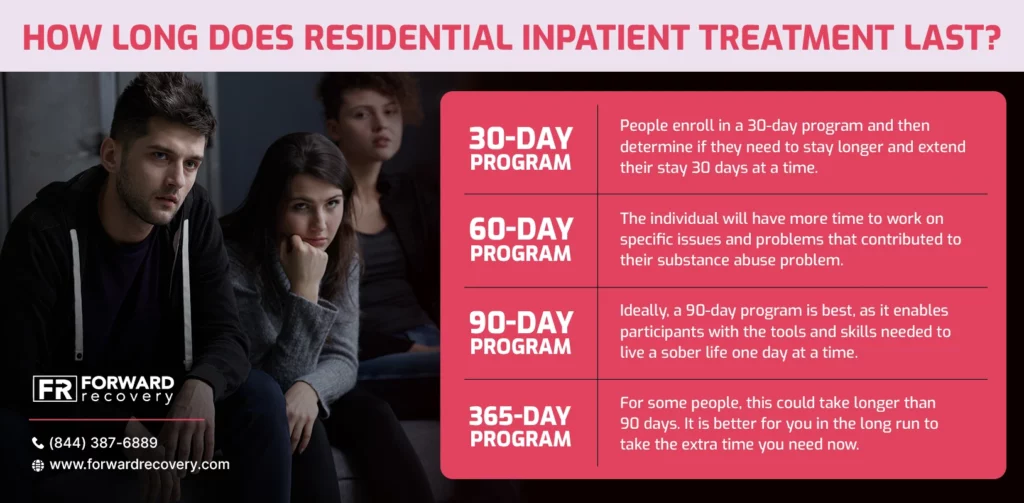How Long Does Residential Inpatient Treatment Last?
Post Views: 5,108
We often receive questions about how long the recovery program will last and how long they need to stay in residential inpatient treatment. There’s no definite answer to that, as everybody responds differently to the treatment. It also depends on what kind of treatment they choose and which drug they are addicted to. But, as a general rule of thumb, you can expect the program to last somewhere between 30 days to 12 months. But if you are not sure if you can spare that much time away from your family and loved ones, you have nothing to worry about. They allow regular visits for friends and family, so you will never feel alone. But, a 30-day program is a good starting point and based on the results and progress of the program, doctors will decide if you need to continue the residential inpatient treatment. Or, you can choose a 60-day treatment program, which would provide the patient with enough time to work on their addiction issues and the underlying psychological issues behind the addiction. This way, the root cause of the issue will be addressed, preventing them from getting addicted again in their lives. The more time you give in to the treatment, the higher your chances of living a happy, healthy, and drug-free life. So, if you choose to go for a 90-day program instead of the 60-day one, you get 30 extra days in the program, which you can use to work on your skills and life to prepare to live a sober life. You can learn everything from prepping and cooking meals to fitness and relaxation guidelines.What is Residential In-patient Treatment?
Usually, people opt for out-patient care programs when they go to a rehab center, especially if they have a less severe drug addiction, but that doesn’t work with everyone. People who need intensive treatment or those with severe drug addiction need residential inpatient treatment. This could be if they relapse, have some psychological disorders, or live in an environment with regular substance abuse. The residential inpatient programs are perfect for such individuals as it provides a safer environment, excellent caretakers, 24/7 surveillance, etc. 
How to Choose the Right In-patient Program?
If you are determined to say goodbye to your addiction and live a happy and healthy lifestyle, then the right choice would be to get into an inpatient treatment program, but you must get into the right one. Not all rehab programs are made equal, and each program is designed to treat unique drug addiction. Which program you get highly depends on which drug addiction you have, how long you have been addicted, and whether or not you have any psychological issues. Choose a program with at least 60 – 90-days for optimal treatment if it’s your first time. But if you have been to rehab before or had a relapse, you will need a different program with a much longer duration. If you ask for a recommendation, we suggest Eagle Recovery drug rehab center as they have excellent addiction treatment services. What Should You Do After Your Residential In-patient Program?
Once you are out of the treatment, your goal should be how to go back to everyday life with safeguards to ensure you don’t fall in the same line as before and relapse. Add essential activities in your life such as exercise, cooking, therapy, and moving in an appropriate environment, among other things, which will keep you busy and in better health and sober mind. Therapy is especially important as it allows you to talk about the issues you have been facing since coming out of the treatment. Talking to your therapist about problems at work or any domestic issue will have to get relief from stress build-up and discourage you from getting drugs again.Conclusion
How long the treatment takes shouldn’t be much of an issue, and instead, the focus should be on their treatment and how it will help them. Along with their addiction treatment, they should also join therapy to work on their underlying psychological conditions in the program.






Leave a comment
You must be logged in to post a comment.